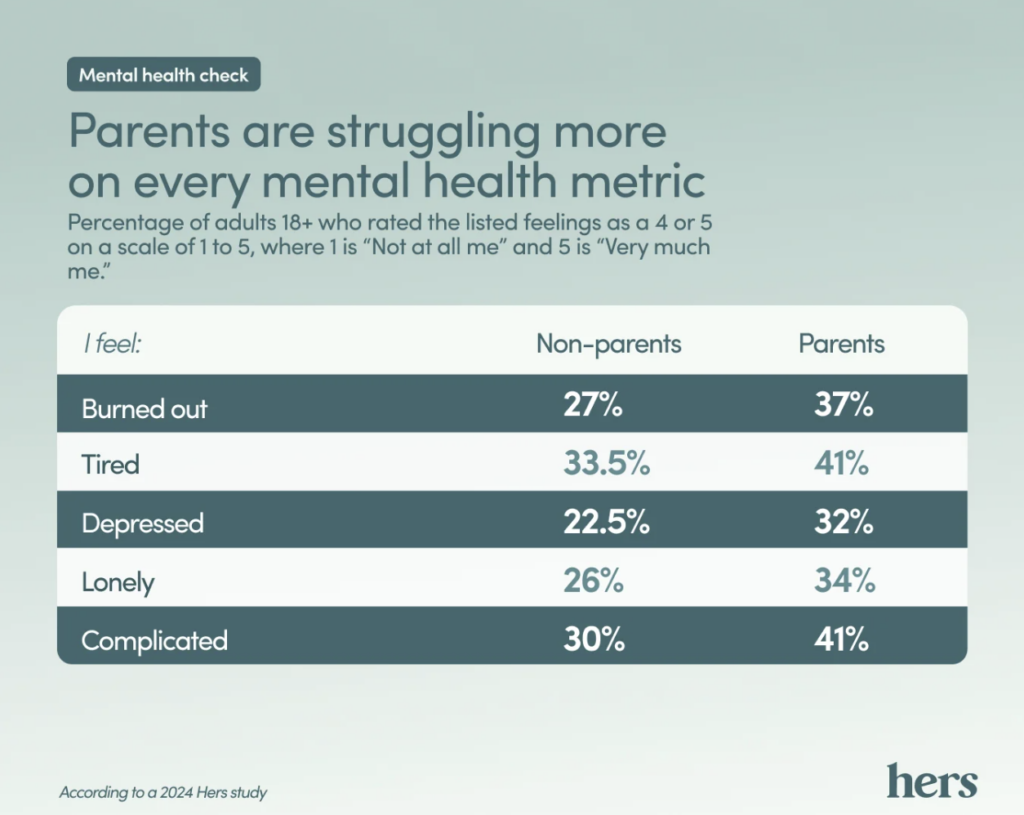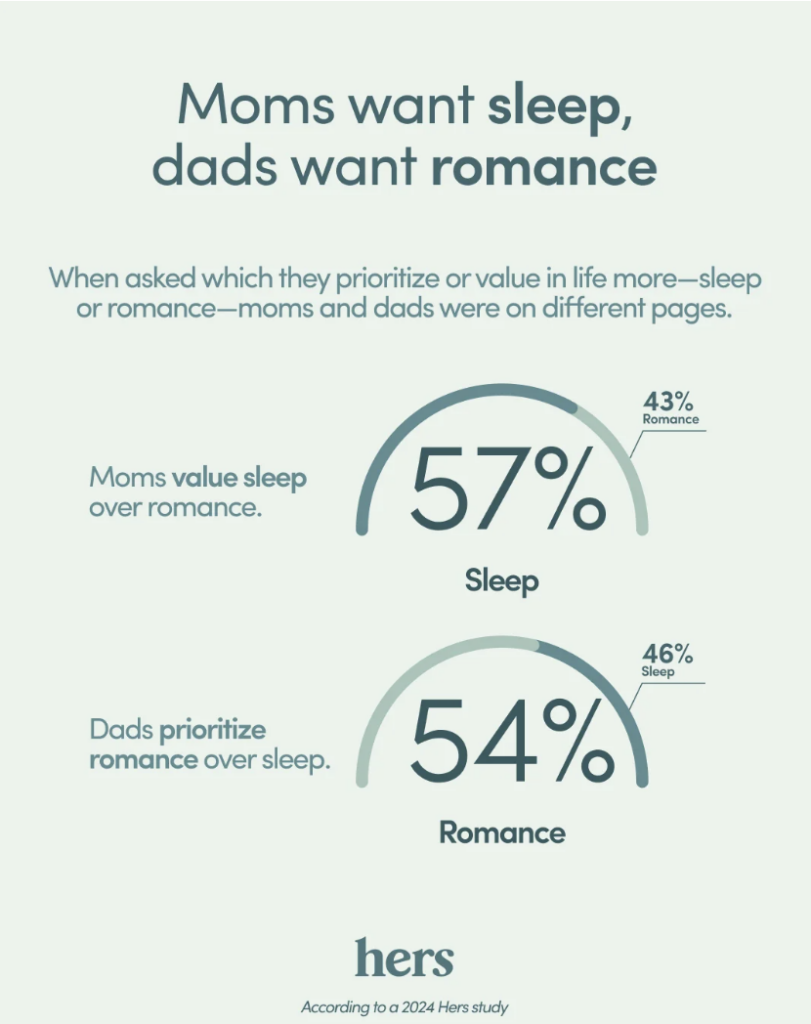How Parents Can Keep Holiday Stress In Check

Parents are struggling more on every mental health metric—here are a psychologist’s tips for keeping holiday stress in check.
According to the Surgeon General, parents aren’t okay. Earlier this year, an advisory warning was issued saying that the pressure parents are under has become nothing short of a public health crisis.
Based on a report by the American Psychological Association, over the last decade, parents have been consistently more likely than other adults to report experiencing high levels of stress. The report found that 48% of parents said they’re completely overwhelmed by stress and 41% say they can’t function most days because of it. A conversation with any mom or dad will likely validate this finding. The pressure cooker of parenthood is real, and moms and dads admit they can’t keep up—particularly during the holiday season.
A 2024 Hers study confirmed just how stressed parents are. They report being more burned-out (+37%), tired (+22%), depressed (+42%), lonelier (+31%), and feeling that life is more complicated (+37%) than adults without kids.

Mental Health Metrics Among Moms And Dads
All of this is impacting parents’ overall mental health, with 69% of parents saying they are worried they have a mental health condition compared to 59% of non-parents. This stress naturally takes a toll on family life and may even impact the economy: 66% of parents say their mental health impacts their job performance as compared to just 44% of non-parents.
Who can blame them? The economy has been trying to make a soft landing since the pandemic; political instability is the new norm (this past presidential election particularly put the country on edge); the safety nets families used to count on—from social security and job security to being able to afford health care and a home—are not nearly as reliable or accessible. And then there are college applications, tuition payments, and raising kids in the TikTok era, which is an entirely new terrain. It’s no wonder moms and dads are breaking down.
By the time the holidays come around, parents are tapped out. It may be the “most wonderful time of the year,” but holiday stress often includes difficult family dynamics, higher spending, busier schedules, and the pressure to make everything perfect.
However, what we found is that moms and dads diverge in the mental health challenges they face. As such, they need different coping mechanisms—particularly during the hectic holiday season.
Moms Are Multitasking Too Much
While this data didn’t document how many activities moms take on each day compared to dads, moms report they are statistically more tired than dads. In fact, 44% of moms say the word “tired” describes them well (a 4 or 5 on a 5-point scale) as compared to 39% of dads; and 19% of moms say “tired” is one of the top five words that describes them, more than double the percentage of dads who agree (8%).

The Sleep vs. Romance Divide
Moms were 65% more likely than dads to say their perfect day would start with “A good night’s sleep” (33% vs. 20%).
They’d also prefer sleep (57%) to romance (43%)—whereas dads prefer romance (54%) to sleep (46%).
Moms Are On The Go
When moms eat, they’re frequently doing so while taking care of other business. The number one way moms describe their eating pattern is “automatic: I tend to eat on autopilot while I’m multitasking.” Dads’ top eating pattern, on the other hand, is “enthusiastic: I make food a priority, the majority of my social activities revolve around eating.”
All this paints a picture of moms burning out as they try to keep all the balls in the air. Here are tips from a licensed clinical psychologist, Jessica Yu, Ph.D., for moms to slow down during this holiday season and take stock of their mental health.
Mental Health Holiday Hacks For Moms
- Delegate tasks. Moms are notorious for trying to do it all. When it comes to the holidays, this may, as an example, manifest in being the one to come up with the gift list, drive around to the stores to physically pick up the gifts, and stay up late wrapping the gifts. Have a partner, family member, or friend take on some or all of the task. Not only will it save time and energy, it’ll likely help the other person get into the holiday spirit.
- Lean into saying “no.” Doesn’t it seem like there’s an overabundance of holiday activities to potentially participate in? Perhaps the calendar is full to the brim with family parties, school celebrations, dinners with friends, community events, and more. Such activity can be wonderfully festive and utterly exhausting. It is absolutely acceptable to decline an invitation, especially if a mom is feeling tired or overwhelmed. This will allow for the opportunity to rest up so you can enjoy other activities later.
- Don’t try to replicate everything seen on social media. If anyone spends enough time on social media, they’ll surely come across influencers with ideas for a beautifully decorated home, holiday crafts for kids, homemade desserts to make for a party, gifts to consider for everyone on your list, etc. But remember that what you see on social media isn’t actually real life. Don’t feel compelled to do something just because it has a million likes. Do it if it matters to you. If not, ignore it. Better yet, turn off social media and work on being mindful and really enjoying the holiday season.
Dads Need A Digital Intervention
Compared to moms, dads report being more depressed and lonelier (see Mental Health Metrics Among Moms & Dads).
While it’s not certain why, too much screen time may play a role—57% of dads say social media is impactful or very impactful on their day-to-day lives as compared to just 43% of moms.
Dads also care far more about how they look on social media than moms (46% vs. 39%). Furthermore, dads are more likely to say social media is a significant stressor for them than are moms (18% vs. 13%).
During the holidays, social comparison is more pervasive, and stressful, than during other times of year. Who doesn’t want to keep up with the Joneses, or the other families on Instagram posting about their perfect holiday plans (home decorated with mistletoe, ski trip to Tahoe, etc.). Unplugging, among other things, is key for dads to restabilize. Here’s a look at a few other psychologist-backed tips for dads.
Mental Health Holiday Hacks for Dads
- Keep technology at bay. As noted above, dads tend to suffer from digital dependency, whether that means spending too much time on social media, poring over their news feeds, or checking email while trying to enjoy some time off. Such dependency can keep anyone from engaging in and enjoying the holiday season. Give the phone, computer, tablet, and other digital devices a rest to be more present in the festivities.
- Phone a friend. Research from the Survey Center on American Life has shown that men’s friendships have changed over time—and not for the better. The number of friendships men report having has decreased, satisfaction with such friendships has decreased, and the amount of emotional support received has decreased. No wonder dads report being more depressed and lonely than moms. This holiday season, combat such negative feelings by reaching out to a friend. Catch up by phone or plan something fun to do, for the sake of your mental health.
- Set expectations—with yourself and others. So much of the holiday season requires people to go, go, go, that they don’t often pause to understand what they want for themselves or those around them. And this lack of clarity may very well contribute to dads feeling like life is complicated around the holidays. Take some time to talk to those nearby—your partner, kids, and other important individuals—about how to spend the holiday season. Being clear about wants and needs will help you make the most of this festive time of year.





